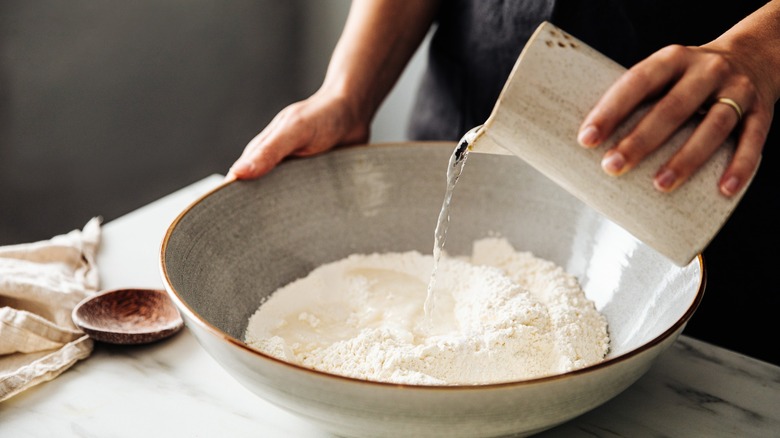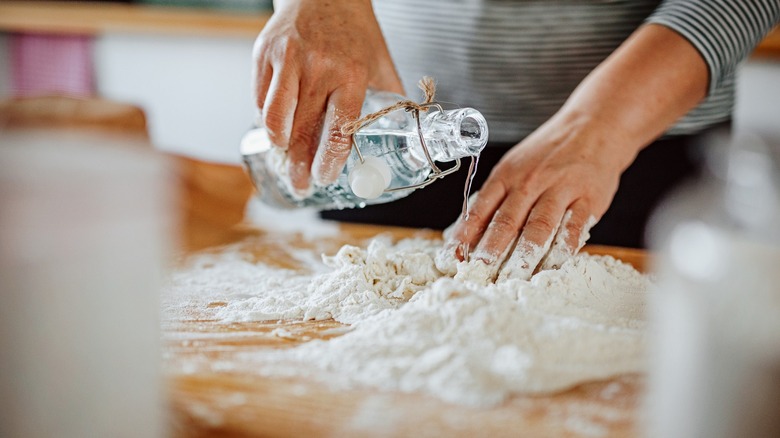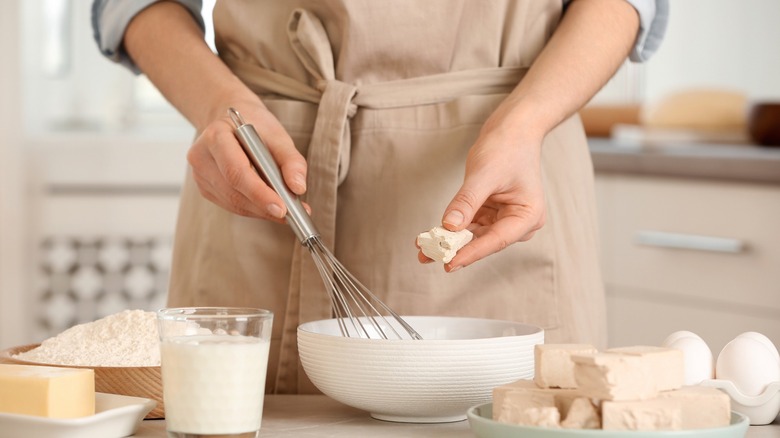Your Water's Hardness Could Be Sabotaging Your Baked Goods
Water may be the simplest part of a baking recipe, but its role in the process is quite complex. It acts as a pathway to allow the rest of the ingredients to dissolve properly, as an activator of yeast fermentation, and as a tool to control the consistency of dough. Due to all of these varying roles, it may come as no surprise that water can be finicky when used in baking. It's not just temperature and volume, either; the hardness of water is a crucial factor in determining the outcome of baked goods.
Pure, distilled water isn't the same stuff that's pouring out of home taps. Most H20, even if it's filtered, contains minerals from the underground deposits from which both municipalities and bottled water companies source their supply. When rainwater passes through the limestone and gypsum that make up the soil and bedrock on its way to an underground aquifer, it dissolves and collects calcium and magnesium that affect its taste and texture. All these additional minerals can wreak havoc on your baking by slowing down fermentation and tightening the gluten too much, creating dough that will snap back when trying to stretch it out and will ultimately be way too tough and chewy.
What's up with hard water?
Hard water is harmless to drink, though some may not prefer the taste and texture. In fact, calcium and magnesium are both electrolytes essential for cellular function. The "hardness" poses much more of an annoyance when cleaning than it does as a drinking source. The calcium in hard water makes soap form scum instead of a bubbly lather, decreasing the effectiveness of shampoo, dishwashing liquid, detergent, and other methods of washing. These minerals can also cause stains in dishwashers and laundry machines, wearing out kitchenware and clothes faster.
By the same token, hard water threatens baking recipes that often require a careful, delicate balance of ingredients, temperatures, and densities to make the optimal type of dough. Just as water dissolves the calcium and magnesium within the rocks it flows through, so too does it dissolve the salt, sugar, and baking powder within baked goods. In moderation, this is actually a desired effect in baking to encourage these additives to disperse and stabilize dough and provide more nutrition for the yeast, a fungus, to consume and ferment. However, water with too much calcium and magnesium will overload the flour and slow down its absorption rate.
Tighten that gluten
In baking, salt is used to tighten gluten so the dough doesn't break apart when stretching and kneading it. However, an overabundance of sodium can overtighten the dough and make it too rigid. Calcium and magnesium, which are electrolytes just like sodium, will also tighten gluten, creating another hurdle in the baking process.
Conversely, soft water that doesn't have enough minerals will also slow down fermentation since there's a lack of food for the yeast. The best is a middle ground water that is, in a Goldilocks fashion, applicable to many areas of baking and cooking, not too hard and not too soft. As a specific measurement, that's any water with a calcium and magnesium ion content of more than 50 parts per million (abbreviated to ppm) and less than 200 ppm, ideally but not exclusively 100 to 150 ppm. Luckily, most potable water falls into this range, but if you're ever sensing that your water is too hard, there are water softeners that are available to install in home plumbing systems. Alternatively, you can also try boiling the minerals out of your water. It's not an exact science, but trial-and-error is a baker's best philosophy.



